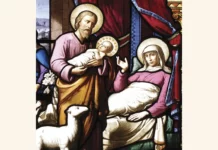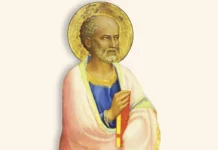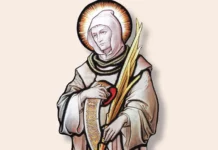Determined to never again serve a mortal master, the fourth Duke of Gandia left court life and put himself in the hands of St. Ignatius of Loyola. As a member and Superior General of the Company, he would be a giant in governing, holiness, and suffering.

Imperial Toledo changed its customary festive garb for bereavement attire on May 1, 1539 when death knocked at its gates, taking the life of Empress Isabella, and plunging her husband Emperor Charles V, and the Spanish nation, into deep mourning.
The lovely face of the most beautiful sovereign of the European courts would no longer be the delight of the nobility and common folk. All that remained was to bury her alongside her grandparents, the Catholic monarchs Ferdinand and Isabella. A stately convoy carrying her mortal remains duly departed for Granada.
To ensure that no unforeseen occurrence would add to his great sorrow, the emperor entrusted this delicate task to a man of utmost confidence: Francis Borgia, Marquis of Lombay, a dedicated vassal of high lineage, who, like no one else lamented the empress’ departure from life at its splendid apex. He pensively headed the cortege, which traversed nearly half the country, arriving in Granada, where the monarch awaited.
“Never again will I serve a mortal master”
The long journey afforded the young marquis time for reflection on the last end of man. Such considerations sowed salutary resolutions, for as Sirach promises: “In all you do, remember the end of your life, and then you will never sin” (Sir 7:36). Seeing the helplessness of his sovereign in forestalling God’s call served to dispel his own hopes in worldly honours and dignities.
But the decisive moment was still to come. “After her death, the empress repaid the services that the marquis had rendered to her in life, and never did she do such good to Francis as after death, as we will see by what happened afterwards.”1
On reaching Granada, the marquis was obliged to testify before the notaries that the casket truly contained the body of the queen. But when the coffin was opened, a putrid odour spread throughout the place, and the decomposed cadaver bore no semblance to the one whose beauty had been her fame.
Then and there, upon completing this painful duty, Francis Borgia acted on an inspiration of grace and made a firm resolution. A phrase frequently repeated by his biographers, sealed his decision: “Never again will I serve a mortal master.”
Just as Isabella had died to this life, the future Duke of Gandia was, from then onward, dead to the world, although circumstances would oblige him to remain at court for a time.
This decisive conversion occurred when he was 28 years old, dividing his life into two distinct phases. The exemplary Christian he was up until then was interiorly transformed into a saintly religious whose virtue “had washed away the stain with which others had tarnished his family name.”2
Trusted confidant of the emperor
Francis Borgia y Aragón-Gurrea was born on October 28, 1510, in the family palace in Gandia, some 60 kilometres from Valencia. He was the firstborn son of the third Duke of Gandia and, on the maternal side was related to the Catholic King, Ferdinand I of Aragon. His mother died when he was a child; he had little contact with his father—a man consumed by state affairs.
After receiving the finest education that the Spanish Golden Age could offer, he was sent to serve as a page at court. Emperor Charles soon noted the rare qualities of this young man of fine lineage and evident humility.
At age 18, at the recommendation of the empress, Francis married a virtuous noblewoman at court, Eleanor de Castro Melo e Menezes with whom he had eight children, all brought up in a climate of justice and piety.
At the time of their wedding, Charles V granted Borgia the title of Marquis of Lombay and appointed him equerry to the empress. And, shortly after the death of the sovereign, he entrusted him with the important office of Viceroy of Catalonia, because “he believed Borgia competent to begin with the most difficult administration.”3
This office imposed numerous and burdensome obligations, yet even in activity, the marquis cultivated a deep prayer life and the custom of daily Communion, centuries before this became common practice among the faithful.
“The Holy Duke”
With the death of his father, in 1543, Francis Borgia became the Duke of Gandia, a title that included the dignity of Grandee of Spain, a privilege held by the twenty five principal nobles of the kingdom. His subjects soon realized how well served they were with their exceptional governor and affectionately dubbed him “the Holy Duke”. The kindness of his “harmonious, serene, dignified and delicate” soul shone through him—qualities that were favoured by “his noble education and his fervent, implacable, and constant asceticism.”4
However, the desire to leave the world and all its grandeur clamoured in his soul. The death of his wife in 1546, when he was only 36 years of age, allowed him the opportunity to realize his desire of surrendering entirely to a life of perfection.
A subsequent event that occurred during a visit to Portugal, as a member of the Company of Jesus, illustrates the impact of this decision. Called upon to preach in the Cathedral of Evora, the saint excused himself on the grounds that he was unprepared. The Cardinal Infante Henry replied, “It is enough for my flock to see in the pulpit a man who left so much behind for God.” 5
Secretly admitted into the Company
At that time, another Spanish nobleman, who had left all to dedicate himself to the service of God was consolidating his providential institution in Rome, wisely founding a work he had audaciously conceived. He was Ignatius of Loyola, and his work, the Company of Jesus.
Francis Borgia admired this fledgling spiritual family. As the Viceroy of Catalonia, he penned a letter to Ignatius in 1541. Upon receiving it, the holy founder uttered a surprising prophecy: “Who would believe that one day this man will enter the Company and come to govern it in Rome?”6
Nearly seven years later, the Duke of Gandia—a widower unaware of this prophecy—was seeking to discover which religious order God wished him to enter. In his uncertainty, he consulted his confessor, Franciscan Friar John Texeda, who said: “You should enter the Company of Jesus.” 7 The counsel coincided with his interior aspirations; he wrote to St. Ignatius, and the latter immediately admitted him into the Jesuit Order. However, he recommended him to maintain secrecy on the matter until he was freed of the obligations toward the Duchy of Gandia and his family.
Therefore, Borgia made his profession in February of 1548, demonstrating deep commitment but continuing to exercise his important public role. In August of 1550, he received his doctorate, completing his preparatory studies for the priesthood, signed his will and conditionally transferred the administration of the Duchy of Gandia to his heir, Charles.

Meeting with St. Ignatius
As he now enjoyed the full freedom of the sons of God, Francis set out for Rome to meet Ignatius of Loyola. He departed with supernatural haste but could not elude an illustrious retinue of priests and nobles. At the end of October, he arrived at the door of the Teaching House of the Jesuits, where St. Ignatius awaited him, at the head of the entire community. The two saints knelt before one another and Francis repeatedly kissed the hands of his founder.
From Rome, he wrote the Emperor Charles V on January 10, 1551: “Thus, having weighed my options after the death of the Duchess, having reflected for four years, having requested the prayers of several servants of God for this intention, and with my desire growing each day and the veil of darkness lifting from my heart, although I do not deserve to be employed in the vineyard of the Lord, especially having arrived so late and limiting myself until now to uprooting the vines others have planted; nevertheless, as divine goodness is boundless and God’s clemency an immense ocean, it has pleased your servants of the Company of Jesus to decide to admit me into their Order, in which I have long desired to live and die.”8
One month later, in a letter to Guillaume du Prat, Bishop of Clermont, he disclosed his conviction of the significance of the role of the Jesuit Order in those critical years of the Counter-Reformation: “In other times, divine wisdom has generously provided different means to furnish the needs of the Church; today He seems to have chosen this Company so that by word, example and all its works of charity, it will aid its Spouse.”9
Conviviality with the founder
God clearly desired to compensate St. Ignatius for the difficulties suffered in the first years of the recently founded Order, by sending him this peerless son. All in Rome were astonished by his simplicity. He served tables and washed dishes with the same naturalness with which he had previously governed Catalonia. He captivated his listeners when he spoke of Our Lady and invariably increased their devotion to her.
The months spent with his founder were rich and fruitful. Just like Francis Xavier, this other Francis was one of those who knew his founder’s heart most intimately and reflected it wholly in his own. Following the example of fidelity to St. Ignatius proffered by the Apostle of the Indies, Francis Borgia was the confidant, and subsequent executor of the great desires of the founder, since it is known that in this early period, “the two saints spoke at length about their projects.”10 During this period of conviviality, he received the Ignatian charism in its purity and plenitude.
Grandeur in suffering
On his return to Spain, the Duke of Gandia renounced his ranks, titles, and goods before a notary public, was clothed as a Jesuit, and ordained a priest on May 23, 1551. He celebrated his first public Mass the following month before a crowd of ten thousand faithful. Those who came forward for Communion vied with each other to receive from his hands. He went on pilgrimage to the Castle of Loyola and celebrated Mass in its oratory; he finally settled in Oñati, in the Basque Country, far from court and family.
Despite his desires, he did not pass unnoticed in those regions, since his apostolate attracted multitudes. But early success did not assuage the advent of deep sufferings played out against a dramatic backdrop. Some of these stemmed from the hostility of King Philip II, who bore grievances toward the Borgia family, others came from problems within the Company, and still others from physical infirmities. By trying him in this way, Providence proved—from a higher perspective—that Francis was an especially chosen son, and great in everything, especially suffering.
Successor of St. Ignatius
After the death of St. Ignatius, in 1556, Father Diego Laynez governed the Company for nine years, two as Vicar General and seven as Superior General. He died in 1565. On his deathbed, he looked intently on Father Francis Borgia—a premonition of the future that awaited him. The elections held in the same year confirmed this silent prophecy, since Francis was indeed chosen. The unanimity of votes was proof that the Company was convinced that the saint represented the spirit of the Institution.
From this period of his life precious documents, including his diary and letters, have come down to us. Missives written as General of the Order reveal the profile of a saint and man of authority: in clear and direct language they offer directives given by one who knows the hardships of the route as well as the fragility of the man who travels it.
From local superiors who were overly strict with subordinates he demanded greater kindness and affability. To missionaries tempted to despondency by the hardship of the apostolate, he revealed a paternal heart that was conscious of the bravery demanded of them: “Take heart while thinking of the consolation that we experience, in Europe, praising the Lord for the courage that He gives to those that far away fight for love of Him,”11 he wrote in 1568 to Father Gregory Serrano, on mission in recently discovered Brazil.
However, in face of hardened religious he wisely used the authority warranted by his office and permitted no compromise. One of his biographers comments that when necessary, “he was forceful, saying that St. Ignatius preferred to see a useless person leave the Company than a good one enter it.”12

Mosaic in the Jesuit Church of Santander (Spain)
Departure for eternal glory
St. Francis Borgia governed the Company of Jesus for seven years. During this time he shouldered the grave responsibility of forming the first generation of religious who did not personally know their founder, a duty he fulfilled with perfect fidelity. Under his leadership, the Order acquired stability, opened numerous colleges and gained a stable presence in the missions. In this short period, 66 Jesuits were martyred, including Ignatius de Azevedo and his 39 companions.
St. Francis Borgia died in Rome, in the early morning of October 1, 1572. It was a joyful departure for the Eternal Homeland, worthy of one who had given everything to God and was ready to receive incomparably more from Him.
Thorn in the conscience of the worldly and powerful
The Church owes two noteworthy benefits to the inspired genius of the fourth Duke of Gandia: the institution of novitiate houses, adopted by other religious orders and congregations in view of the good results reaped by the Jesuits, and the foundation of the Gregorian University of Rome.
On a subordinate level, the passage of centuries has revealed him as an exponent of the Counter-Reformation, whose example was a thorn in the conscience of the worldly and powerful of his time, who in opening their souls to the neo-pagan tumult of the Renaissance, “were already the real precursors of the greedy, sensual, laicist, and pragmatic man of our days and of the materialistic culture and civilization into which we are sinking deeper and deeper.”13
Although our socio-cultural context is different than that in which this Grandee of Spain and General of the Company of Jesus lived, his enthusiastic fidelity to Christ and the Church invites us to ask for men in this present age, who with today’s methods achieve even greater works than he did in his. Let us beseech that, from heaven, St. Francis Borgia will guide us toward the most daring and courageous evangelizing initiatives that the glory of God so merits. ◊
Notes
1 NIEREMBERG, SJ, Juan Eusebio. Vida de San Francisco de Borja. Madrid: Apostolado de la Prensa, 1901, p.49.
2 DANIEL-ROPS, Henri. A Igreja da Renascença e da Reforma. II. A reforma católica. São Paulo: Quadrante, 1999, v.V, p.62.
3 FONSECA, SJ, Manuel da. Francisco de Borja. Petrópolis: Vozes, 1942, p.27.
4 Cf. RUÍZ JURADO, SJ, Manuel. Edición crítica, estudio y notas. In: BORJA, Francisco de. Diario Espiritual. Bilbao: Mensajero; Santander: Sal Terrae, 1997, p.20.
5 FONSECA, op. cit., p.104.
6 Idem, p.39.
7 Idem, p.45.
8 Idem, p.51-52.
9 Idem, p.55.
10 SUAU, SJ, Pierre. Saint François de Borgia. Paris: Victor Lecoffre, 1923, p.98.
11 FONSECA, op. cit., p.139.
12 Idem, p.120.
13 CORRÊA DE OLIVEIRA, Plinio. Revolução e Contra-Revolução, [Revolution and Counter-Revolution]. 5.ed. São Paulo: Retornarei, 2002, p.28.






